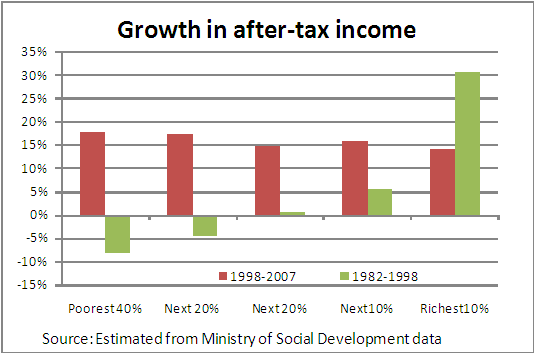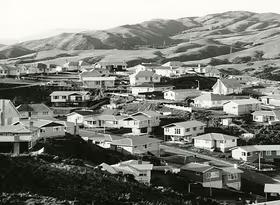Sharing the fruits of growth
Real disposable incomes of Kiwi households have been rising on average for a considerable length of time even after taking into account increasing costs of food, fuel and mortgages. This was very clearly demonstrated by a colleague of mine – Chris Worthington – in this column some weeks back. But averages sometimes disguise differences across social strata. Have we all being been enjoying the fruits of growth?
Some startling statistics from the US raise our interest in this question. The Economist newspaper reported recently in an article about widespread American despondency, that between 2002 and 2006 the incomes of 99% rose by an average of 1% a year in real terms, while those of the top 1% rose by 11% a year. Three-quarters of the economic gains during George Bush’s presidency went to that top 1%. There are numerous reasons for America’s despondency but that many Americans feel they missed out on the boom is a major contributor.
How does New Zealand compare in this regard? Data from an outstanding report from the Ministry of Social Development shows that the answer depends on the time period of our analysis. Between 1982 and 1998 there was a rapid rise in inequality. Average after-tax incomes of individuals in the poorest 40% of households declined by 8% while incomes of the richest 10% rose by 31% (see chart). Over this period almost half of the proceeds of growth accrued to the richest 10%. Not quite in the same league as the Bush years in the US but enough to raise a few eyebrows.
Since coming into power in 1999 the Labour Party has adopted a redistributive stance. The wealthy were whacked with the introduction of the 39% tax bracket in 1999 while bracket creep has further raised average tax rates. But despite these tax increases the richest 10% have enjoyed a healthy 14% growth in after-tax income between 1998 and 2007. In contrast to higher taxes on the wealthy, working lower and middle income families have been given tax relief through the Working for Families programme. Predictably then the poorest 40% enjoyed the highest growth in income between 1998 and 2007, but at 18% was only marginally higher than that enjoyed by the top 10%. In fact Labour’s tenure has been characterised by an extremely equitable sharing of the economic gains.
Labour has overseen a period of strong income growth and has ensured all strata of society have benefitted. But it would be simplistic to grant them full credit. To what extent did the era of economic reforms in the 80s and 90s that was characterised by low growth and rising inequality create the conditions for the robust economic growth of the 2000s which gave them room to ease the tax burden of low and middle income working households? And have Labour’s redistributive policies undermined the growth potential of the economy and thereby reduced the potential for future income growth of all households?
It is difficult to believe that the high effective marginal tax rates of Working for Families won’t impose a drag on the economy. At some income levels a rise in pay perversely results in a fall in after-tax income as the pay increase pushes the individual into a higher tax bracket and to a lower Working for Families tax credit. These high effective marginal tax rates create a disincentive for individuals to seek higher wages through upskilling, promotion or sheer hard work. How can we grow the economy if we take away the reward for initiative?
The relationship between income inequality and economic growth is complex and we don’t fully understand it. But we know that at the extremes income inequality can undermine growth. An overly skewed distribution of income undermines social cohesion and can result in social unrest with negative consequences for growth. The perception in the US that so many of its citizens have not benefitted from the boom could have damaged consumer confidence which undermines consumer spending and growth. At the other extreme an overly egalitarian society removes the incentive for individuals to take risk and invest and create new wealth.
Our policy makers not only need to be conscious of inequality within our borders but also of disparities between ourselves and our neighbours. The gulf in income between New Zealand and Australia is a major contributor to the haemorrhaging of our workforce across the Tasman. That gap needs to close quickly by pursuing strong growth policies. But with income inequality in New Zealand at the high end among comparable developed countries the government should not take its eye off the equity scale. It is a tough balancing act between achieving growth and sharing it equitably. But have we slipped too far towards the latter?
















